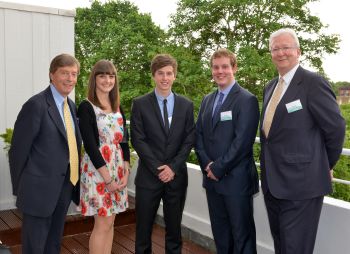More students than ever learn to lead
Posted on behalf of: Careers and Employability
Last updated: Friday, 28 June 2013

Sussex students who benefited from a challenging leadership programme have praised the experience.
Speaking at a dinner to celebrate the end of the 2012-13 Learning to Lead Accelerator programme, History finalist Abigail Smith said: “The importance of self-reflection and spending time to consider my leadership potential and evidence of my ability and skills was really confidence building and, when applying for jobs, I can say, I’ve got these skills and I can show you why.”
The programme was greatly expanded for this, its fourth year, and Abigail was one of 120 Sussex students (an increase from 30 in 2011-12) who were offered the opportunity to gain an understanding of the key skills, personal attitudes and experience that leaders need to develop, including team working, decision making and change management.
The Careers and Employability Centre teams up with international leadership-training consultancy Clemorton to offer the intensive programme, which uses a mixture of group and individual exercises, role play and experiential learning.
It also features contributions from Sussex alumni, drawing on their experiences as senior leaders in different sectors of the economy.
At the celebration dinner - hosted by the Vice-Chancellor, Professor Michael Farthing - second-year Psychology undergraduate Jordan Raine recalled: “The alumni talks provided a great insight into leadership in the real world. I had always thought that leaders were just born but I now understand clearly what leadership and management are - and meeting Sussex alumni was inspiring.”
The programme was re-designed this year to challenge and motivate the participants at each of its various stages – with the aim of replicating graduate-recruitment selection processes.
Of the original 120 students, 86 submitted web profiles.
For the next stage, 57 of the group were chosen to be assessed for their potential as a leader and on their presentation skills by a panel consisting of Sussex alumni and professional employability careers advisers.
This part of the programme was introduced this year in response to feedback from employers that universities need to offer more opportunities for students to deliver presentations in a professional setting.
It certainly worked for Contemporary History postgraduate Adam Tolcher, who said at the celebration dinner: “I’m intending to work in marketing and the insights gained about marketing and presenting myself in the leadership and presentation to the panels was invaluable.”
Thirty of the 57 students who had given presentations were then selected for the final stage, which involved additional training and one-to-one coaching from Clemorton.
And the programme culminated in the celebration dinner on Wednesday (26 June), when the 27 students who completed the course gained affiliation to the Institute of Leadership and Management (ILM) and received Sussex Plus certificates.
After-dinner speaker John Cutts, who studied Engineering at Sussex from 1969-72 and is now Chief Executive of corporate finance business Pall Mall Capital, shared his reflections about leadership and what he described as “followership”: the ability of great leaders to inspire their followers to action.
He used Winston Churchill, Mahatma Gandhi, Napoleon Bonaparte as examples to illustrate this generally ignored concept and outlined how the leadership skills to inspire great “followership” are key to establishing all kinds of initiatives in the world.
The Learning to Lead Accelerator programme is funded by the Sussex Fund with the generosity of Sussex alumni through the Development and Alumni Relations Office. It is part of the Sussex Plus initiative, helping students to develop their skills and employability.
Applications for Learning to Lead Accelerator 2014 will be opening soon. Sussex students can register their interest by emailing careersevents@sussex.ac.uk

